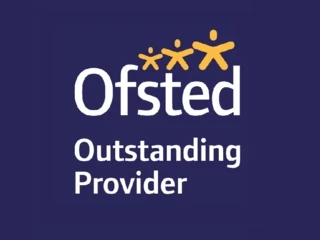
Training Programme Nomination
A dedicated route onto our teacher training for school support staff. Nominees remain in their current school, get paid to train and take their career to the next level.
Develop great teachers from within your school
The Training Programme Nomination route helps to develop and retain talented staff, helping them become qualified teachers in their current school and earning a salary from day one.
This ensures stability and continuity for your school while giving staff access to Ofsted-rated ‘Outstanding’ teacher training, expert mentoring, and leadership development.
Over two years, this cost-effective route equips new teachers to hit the ground running with Qualified Teacher Status (QTS) and a PGCE.
It’s an opportunity to shape brilliant teachers who already understand your students, values, and community inside out.
Nominate your staff for the programme starting in September 2026.

How the programme works
Before the programme starts
- Complete preparation work.
- Attend initial teacher training at Institute
Year One – training while working in school from day one
- Teach a reduced timetable (EY/Primary: 60%, increasing to 80% by Christmas; Secondary: 80%).
- Attend training days and conferences run by Teach First and university partners.
- Achieve Qualified Teacher Status (QTS) and a PGCE (worth 60 master's credits).
Year Two – teaching a full timetable as an early career teacher
- Teach a full timetable with additional leadership responsibilities.
- Continue mentoring, leadership development, and one-to-one support.
Nominate your staff for the programme starting in September 2026.
88%
of headteachers rated the quality of our Training Programme as ‘very good’ or ‘good’, recognising its impact in developing skilled, confident teachers who make a real difference in the classroom.


Who can be nominated?
You can nominate:
- Current school support staff: teaching assistants, cover supervisors, lab technicians, unqualified teachers.
- Other individuals known to the school: school governors, mentors, parents, former staff.
Eligibility criteria
- Degree: 2:2 or above
- GCSEs: Grade C/4+ in Maths & English (plus Science for primary)
- Right to work in the UK (visa sponsorship unavailable)
- Commitment to tackling inequality
Unsure about eligibility? Contact us
How to nominate a staff member
- Step 1: Submit a nomination - Headteachers put forward a candidate.
- Step 2: Candidate assessment - Short application, subject knowledge test.
- Step 3: Start training - Nominees join the next cohort while working in your school from September.
Nominate your staff for the programme starting in September 2026.
For support staff: Take your career to the next level
Our training programme is a direct, salaried pathway for you to become a qualified teacher. You’ll benefit from outstanding training while staying in your school. Ask your headteacher to nominate you.

Cost of hiring a Teach First trainee
- Salary: Schools pay trainees within the unqualified teacher pay range in Year 1, increasing in Year 2.
- Funding support: Schools receive a £2,400 mentoring grant, and programme fees vary by subject.
- See full salary, funding, and eligibility details
Salary
- Year 1: Paid on the unqualified teacher pay range (U2 for most subjects, U3 for maths, MFL, and science).
- Year 2: Increases to a qualified teacher salary.
Funding support
- Schools receive a £2,400 mentoring grant in Year 1.
Programme costs
- Secondary: £4,560 (non-shortage) | £5,025 in year 1, £6,700 in year 2 (MFL) | £4,900 in year 1, £7,000 in year 2 (maths, physics, biology, chemistry, computing)
- Primary/Early years: £2,400 (Year 1) | £1,600 (Year 2)
School eligibility
We prioritise recruiting trainee teachers for schools in England that teach a high number of pupils from low-income backgrounds - usually schools that are ranked in the top 70% most deprived areas and where the proportion of pupils eligible for pupil premium is in the top 50% of all state-funded schools. If you think your school would benefit from our support but doesn’t match the standard eligibility criteria above, get in touch.

Help your staff and pupils thrive
Nominate your staff for the programme starting in September 2026.
Explore our other programmes for schools.
Have questions? Visit our Training Programme Nomination FAQs for more information.